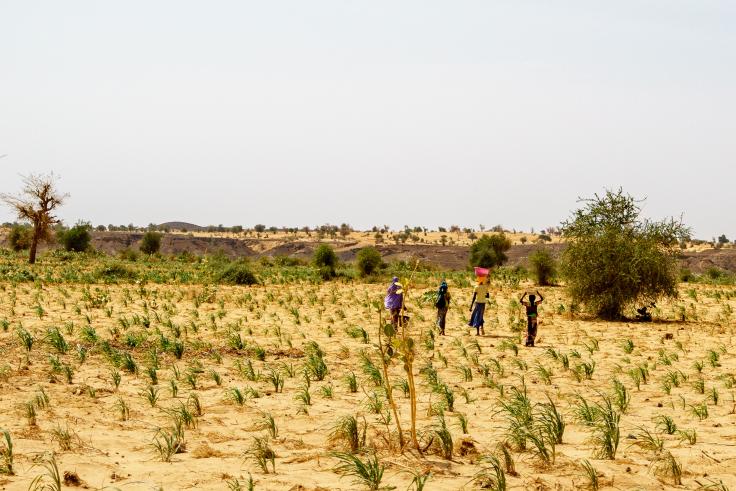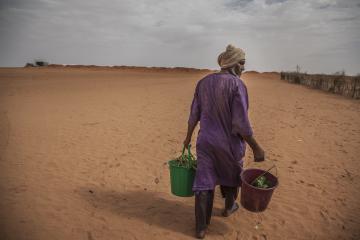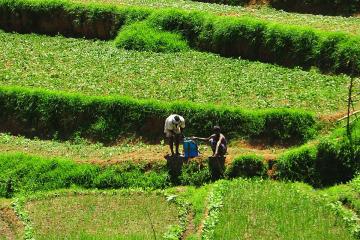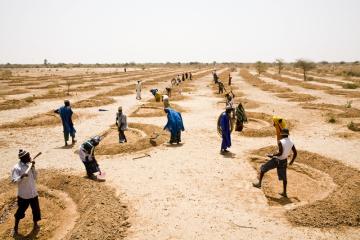
Providing quick financial support to families in advance of extreme weather events can improve their resilience and recovery.

Governments and humanitarian organizations should invest in anticipatory cash transfer programs to help families better cope with extreme weather events. Families and communities can recover faster if they have financial support in anticipation of an emergency.
Funders and governments should invest in early warning systems and accurate weather forecasting infrastructure. Without accurately forecasting weather emergencies, programs can’t reach families quickly when it matters most. These systems are critical for anticipatory action in preparation for emergencies.
Implementers should prioritize rapid response, aiming to deliver support before disasters. People who receive support early fare the best. It is important to build delivery systems before crises strike, so that cash can reach families quickly when time is of the essence.
Extreme weather is becoming more common, with potentially devastating effects on local communities. Droughts, heavy rainfall, dangerous storms, and other weather-related shocks are happening more often, lasting longer, and causing more damage than ever as a result of climate change. These events destroy food sources, disrupt economies, and damage property.
Cash transfers are most helpful when they come before, rather than after, an emergency. Cash transfers or emergency loans sent in anticipation of a major weather event can help communities recover faster, reducing the likelihood that families will go hungry. From Bangladesh to Niger, giving families cash when they were forecast to experience extreme weather, such as floods or droughts, helped them better afford food and, in some cases, improved their mental health and well-being. In Niger, when researchers compared the benefits of cash transfers before, during, and after a drought, they found that the families who received cash the earliest fared the best, underscoring the importance of early action.
Accurate weather forecasts and effective early warning systems are essential to predicting crises and responding quickly. The only way to implement a truly anticipatory cash transfer program is to be able to predict with accuracy when and where weather emergencies will happen. Artificial intelligence and machine learning may improve forecasts and help governments anticipate weather emergencies in the future.
Early findings are promising, but more research is needed to understand long-term impacts. More pilot programs and rigorous evaluations will help policymakers design programs that support families in both the short- and long-term. For example, it’s important to understand the trade-offs between sending money to the smaller number of families most impacted by a weather event (which means waiting until after the emergency to see who is most in need) versus sending money to more families who might be impacted in advance (which allows for earlier action, but may require smaller transfers if budgets are limited).
Cost and design considerations
Anticipatory cash transfers may be a cost-effective approach to disaster response, although cost-effectiveness data is limited. Providing anticipatory support can increase the impact of each dollar spent and reduce the likelihood of economic downturns in the wake of a disaster.
When designing anticipatory cash transfers, policymakers should prioritize forecast accuracy and timing. Effective programs rely on forecasts. Without an accurate understanding of the likelihood of an extreme weather event, programs can’t deliver aid to the families who will need it most. Building rapid delivery systems is also key, given evidence that sending cash later reduces its impact.
If it is not possible to send money before a weather emergency, acting as quickly as possible after a disaster makes a difference. Moving quickly, even if the money will arrive after a weather emergency, makes a difference for families. In Nepal, families who received cash support as soon as possible after a flood (most within two days) were able to afford more food and experienced better mental health than families who received cash 1-2 months after the flood.
When designing anticipatory cash transfers, policymakers should prioritize forecast accuracy and timing.
Implementing partners
Implementers bring deep local knowledge, technical expertise, and a commitment to evaluation and learning as they bring these programs to life. These include the following (listed in alphabetical order); this list is not exhaustive.

Government leadership is essential in disaster response. In many countries, government systems play a large role in forecasting weather emergencies and responding with support. Integrating any emergency cash transfer program with these systems is essential to reach as many people as possible. In the case of Niger, for example, the government works directly with the humanitarian response system to develop response plans based on projected droughts and food insecurity. The World Food Programme is partnering with local and national government partners in 44 countries to use timely cash transfers via mobile money to support millions of people forecast to experience extreme weather, such as droughts, floods, and cyclones.
The role of foreign assistance and philanthropy
Philanthropy and multilateral and bilateral donors have enabled innovation in anticipatory cash transfers. Donors such as the UK Foreign, Commonwealth and Development Office and USAID, and philanthropic foundations including the IKEA Foundation and the Rockefeller Foundation, have all supported pilot programs and research on anticipatory action, enabling rapid learning and adaptation of programs to meet the needs of communities. King Philanthropies also provided the funding for J-PAL’s King Climate Action Initiative, which is funding an ongoing evaluation in Bangladesh testing anticipatory action policy design. As results from pilots around the world have been positive, there is increasing interest from donors in scaling up forecast-based cash transfers.
Discover more from other sources
Anticipatory action
United Nations Office for the Coordination of Humanitarian Affairs
Strengthening climate resilience in agriculture
VoxDev
What do we know about cash and in-kind transfers in humanitarian settings? Not enough
World Bank
Cash Transfers in Humanitarian Contexts
World Bank
Anticipatory action for climate shocks
World Food Programme
Photos:
(1) Credit: Sk Hasan Ali, Shutterstock.com
(2) Credit: Catay, Shutterstock.com


